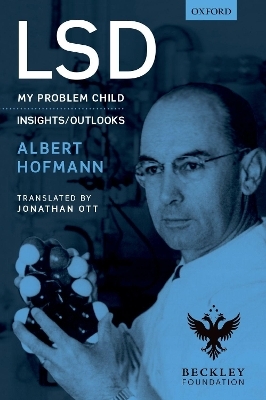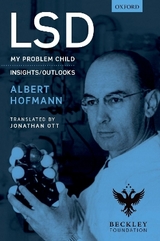LSD
My problem child
Seiten
2018
Oxford University Press (Verlag)
978-0-19-884020-6 (ISBN)
Oxford University Press (Verlag)
978-0-19-884020-6 (ISBN)
Albert Hofmann, who died in 2008 aged 102, synthesised LSD in 1938. Although his work produced other important drugs, it was LSD that shaped his career. Shortly before his death, Hofmann approved a new and updated translation of his autobiography (first published by McGraw Hill in 1979). It appears here for the first time in print.
Albert Hofmann, who died in 2008 aged 102, first synthesized lysergic acid diethylamide (LSD) in 1938, but the results of animal tests were so unremarkable that the chemical was abandoned. Driven by intuition, he synthesized it again in 1943, and serendipitously noticed its profound effects on himself. Although his work produced other important drugs, including methergine, hydergine and dihydroergotamine, it was LSD that shaped his career.
After his discovery of LSD's properties, Hofmann spent years researching sacred plants. He succeeded in isolating and synthesizing the active compounds in the Psilocybe mexicana mushroom, which he named psilocybin and psilocin. During the 60s, Hofmann struck up friendships with personalities such as Aldous Huxley, Gordon Wasson, and Timothy Leary. He continued to work at Sandoz until 1971 when he retired as Director of Research for the Department of Natural Products. He subsequently served as a member of the Nobel Prize Committee, and was nominated by Time magazine as one of the most influential figures of the 20th century.
In 2007, Albert Hofmann asked Amanda Feilding if she could publish his Problem Child, and shortly before his death he approved a new and updated translation of his autobiography (first published by McGraw Hill in 1979). It appears here for the first time in print.
Albert Hofmann, who died in 2008 aged 102, first synthesized lysergic acid diethylamide (LSD) in 1938, but the results of animal tests were so unremarkable that the chemical was abandoned. Driven by intuition, he synthesized it again in 1943, and serendipitously noticed its profound effects on himself. Although his work produced other important drugs, including methergine, hydergine and dihydroergotamine, it was LSD that shaped his career.
After his discovery of LSD's properties, Hofmann spent years researching sacred plants. He succeeded in isolating and synthesizing the active compounds in the Psilocybe mexicana mushroom, which he named psilocybin and psilocin. During the 60s, Hofmann struck up friendships with personalities such as Aldous Huxley, Gordon Wasson, and Timothy Leary. He continued to work at Sandoz until 1971 when he retired as Director of Research for the Department of Natural Products. He subsequently served as a member of the Nobel Prize Committee, and was nominated by Time magazine as one of the most influential figures of the 20th century.
In 2007, Albert Hofmann asked Amanda Feilding if she could publish his Problem Child, and shortly before his death he approved a new and updated translation of his autobiography (first published by McGraw Hill in 1979). It appears here for the first time in print.
Albert Hofmann, Deceased
Foreword by Amanda Feilding
Translator's Preface by Jonathan Ott
LSD: My Problem Child
1: How LSD Originated
2: LSD in Animal-Experiments and Biological Research
3: Chemical Modifications of LSD
4: Use of LSD in Psychiatry
5: From Remedy to Inebriant
6: The Mexican Relatives of LSD
7: Radiance from Ernst Jünger
8: Meeting with Aldous Huxley
9: Correspondence with the Poet-Physician Walter Vogt
10: Various Visitors
11: LSD-Experience and Reality
Insights/Outlooks
I: Introduction
II: The Transmitter-Receiver Model of Reality
III: Security in the Natural-Scientific Worldview
IV: On Possession
V: The Sun as a Nuclear Power-Plant
| Erscheinungsdatum | 21.02.2019 |
|---|---|
| Verlagsort | Oxford |
| Sprache | englisch |
| Maße | 158 x 234 mm |
| Gewicht | 428 g |
| Themenwelt | Geisteswissenschaften ► Psychologie ► Biopsychologie / Neurowissenschaften |
| Geisteswissenschaften ► Psychologie ► Sucht / Drogen | |
| Medizin / Pharmazie ► Medizinische Fachgebiete ► Psychiatrie / Psychotherapie | |
| Studium ► Querschnittsbereiche ► Geschichte / Ethik der Medizin | |
| ISBN-10 | 0-19-884020-9 / 0198840209 |
| ISBN-13 | 978-0-19-884020-6 / 9780198840206 |
| Zustand | Neuware |
| Haben Sie eine Frage zum Produkt? |
Mehr entdecken
aus dem Bereich
aus dem Bereich
Die Geschichte eines Weltzentrums der Medizin von 1710 bis zur …
Buch | Softcover (2021)
Lehmanns Media (Verlag)
17,95 €
Krankheitslehren, Irrwege, Behandlungsformen
Buch | Softcover (2024)
C.H.Beck (Verlag)
39,95 €




